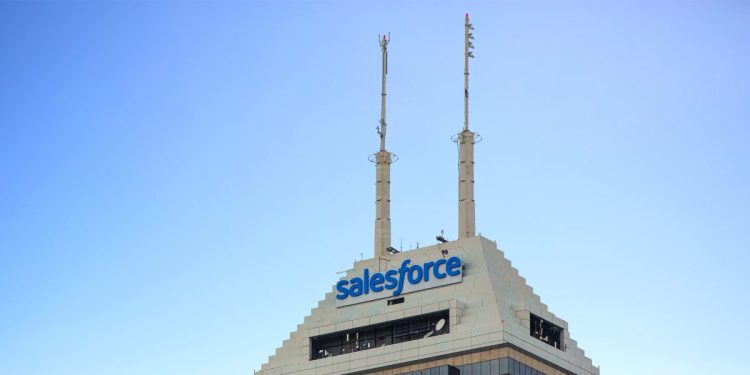Salesforce, the San Francisco software juggernaut that’s made hundreds of billions of dollars developing solutions targeting analytics and customer service, this week revealed that it’s doubling down on two key segments: manufacturing and consumer goods. The company today took the wraps off of Manufacturing Cloud and Consumer Goods Cloud, a pair of new products designed to unify market data from disparate sources in order to maximize revenue while improving customer satisfaction.
“Manufacturing Cloud … delivers a new level of business visibility and collaboration for the sales and operations organizations of a manufacturing company, [while] Consumer Goods Cloud … will help consumer goods companies transform their business [with solutions for] field reps, streamlining operations and elevating in-store experiences for the end consumer,” said Salesforce in a press release. “[Both] allow [businesses] to have a better view of their customers.”
Manufacturing Cloud
Manufacturing Cloud, a part of Salesforce’s Customer 360 Platform for manufacturers, aims to address challenges around predicting demand and resulting inventory stockouts or buildups, which can increase warehousing costs. Specifically, it collates sales agreements and forecasting tools, in theory enabling sales, operations, and account teams to generate more robust projections.
Where sales agreements are concerned, manufacturers can tap Manufacturing Cloud to reconcile negotiated contract terms negotiated with run-rate data stowed in enterprise resource planning (ERP) software and order management systems. Any changes to agreements are immediately propagated to existing sales contracts and their impact reflected across customizable metrics, including committed order volumes, actual volumes, and the performance of the agreement against the forecast.
June 5th: The AI Audit in NYC
Join us next week in NYC to engage with top executive leaders, delving into strategies for auditing AI models to ensure fairness, optimal performance, and ethical compliance across diverse organizations. Secure your attendance for this exclusive invite-only event.
Account-based forecasting, another headlining Manufacturing Cloud feature, allows team members to develop more accurate forecasts and to adjust those forecasts in real time, accounting for new customer requirements or market demands.
“In the manufacturing industry, changing customer and market demands can have a devastating effect on the bottom line, so being able to understand what is happening on the ground is imperative for success,” said Salesforce manufacturing SVP and GM Cindy Bolt. “Manufacturing Cloud bridges the gap between sales and operations teams while ensuring more predictive and transparent business, so they can build deeper and more trusted relationships with their customers.”
Consumer Goods Cloud
Salesforce for Consumer Goods Cloud, on the other hand, is aimed squarely at field reps working from brick-and-mortar businesses. To this end, it’s packed with toolsets intended to streamline store operations by ensuring products are in stock and pricing and promotions are aligned with corporate expectations.
Consumer Goods Cloud provides a daily list of prioritized and assigned store visits with required and suggested activities, all of which are mapped and routed by Salesforce Maps. Reps get access to smartphone-optimized store and segment templates for inventory planning, planogram checks, return order processing, and surveys, and they’re able to capture orders during store visits and collect product data like quantity and pricing.
Consumer Goods Cloud also ships with Einstein Vision for Consumer Goods and Einstein Analytics for Consumer Goods, two new capabilities powered by Salesforce’s proprietary predictive analytics and AI platform Einstein. Reps have at their disposal image recognition and detection for inventory, planogram, and merchandising compliance checks, which they can use to snap pictures of shelves to check if they’re arranged correctly. Those same reps (and their managers) get predefined KPIs like inventory stockouts and percent orders increase per store visit, along with suggestions tailored for their customers.
“Retail execution remains one of the most important pieces of a consumer goods brands strategy, but so much opportunity is wasted if the field rep doesn’t have the data and technology needed to make smart decisions,” said Salesforce retail and consumer goods GM and SVP John Strain. “Consumer Goods Cloud provides these field reps with the tools they need to be successful on the ground while helping build both business opportunities and stronger relationships with their retail partners.”
Manufacturing Cloud and Consumer Goods Cloud will be generally available from October 15, with Einstein Analytics for Consumer Goods to follow in February 2020.
Manufacturing Cloud and Consumer Goods Cloud aren’t Salesforce’s first recommitments to emerging verticals this year. In May, the company announced Salesforce Blockchain, a low-code platform that lets companies create blockchain networks, workflows, and apps that facilitate the sharing of verified, distributed data sets across partner and third-party networks. And in June during its Connections conference in Chicago, it launched Commerce Page Designer, a feature in Commerce Cloud that allows companies to create and manage ecommerce sites visually.


